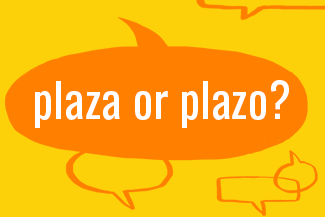Here is another instalment in our series on pairs of Spanish nouns that, while similar in form, have very different meanings. This week’s pair are plazo and plaza.
Let’s begin with the feminine plaza (feminine), whose pronunciation you can listen to here:
An open space in a town or village accessed by a number of streets and often used for events, markets or just sitting and watching the world go by, una plaza is a square:
A las seis de la tarde, atravesó la plaza San Antonio.
At 6pm she crossed San Antonio Square.
Cada año hay una manifestación en la plaza.
Every year there’s a demonstration in the square.
By extension, una plaza can be a place where buying and selling takes place – a market:
en las principales plazas internacionales
on the main international markets
Una plaza can also be a place that’s potentially available to someone, whether it’s a place at a school, on a course or in a competition; a seat on a bus or at the theatre; or a position or post with an employer:
400 ancianos aspiran a conseguir una plaza en la residencia.
400 elderly people would like to get a place in the home.
hoteles con el cartel de ‘no hay plazas’ puesto
hotels with ‘no vacancies’ signs displayed
En mi sección por el momento no hay plazas libres.
There are no vacant positions in my section at the moment.
un helicóptero con capacidad para ocho plazas (piloto más siete pasajeros)
a helicopter that can seat eight (the pilot plus seven passengers)
Moving on to plazo (masculine), you can hear how it’s pronounced here:
While plazas are strongly connected with space, plazos are to do with time: un plazo (masculine) is a period in which something is to happen:
Le conceden para hacerlo un plazo de seis meses.
He’s been allowed a period of six months to do it in.
Si no llegaba a Roma dentro de un plazo de cuatro meses, quedaba depuesto.
If he didn’t arrive in Rome within a period of four months, he would be deposed.
Le doy un plazo de veinticuatro horas.
You’ve got twenty-four hours.
Se le está agotando el plazo.
His time is running out.
El plazo can also be the end of such a period, the deadline:
Ha pasado el plazo.
The deadline has passed.
El túnel se ha terminado dos meses antes del plazo previsto.
The tunnel has been finished two months before the anticipated deadline for completion or the anticipated completion date.
In some expressions, plazo (masculine) translates as term:
Su estrategia a largo plazo es admirable.
Her long-term strategy is admirable.
un préstamo a corto plazo
a short-term loan
Un plazo is also used to refer to an instalment, as in one of two or more part payments for something:
Pueden comprarlo a plazos asequibles.
You can purchase it in affordable instalments.
Podría quedar todavía un tercer plazo de 500 millones pendiente.
A third instalment of 500 million could still be due.
For another in our series on pairs of similar-looking nouns with different meanings, come back next week.



